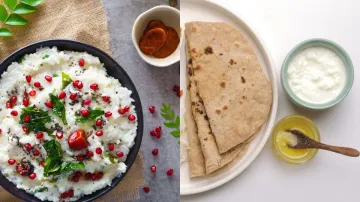Curd Rice vs Dahi Roti: Which is healthier?
Both curd rice and dahi roti are popular Indian dishes that combine the goodness of yoghurt (dahi) with base starch. But which one reigns supreme in the health department? Let's delve into their nutritional profiles to find out.

In the diverse culinary landscape of India, curd rice and dahi roti stand out as popular comfort foods, particularly in the southern and northern regions, respectively. Both dishes incorporate curd (yoghurt) as a key ingredient, which is celebrated for its probiotic benefits. However, when it comes to choosing the healthier option, a closer examination of their nutritional profiles and health benefits is essential.
Nutritional profile:
Curd rice:
Curd rice, a beloved South Indian dish known as "thayir sadam," offers a comforting blend of cooked rice and yoghurt. Typically seasoned with mustard seeds, curry leaves, and occasionally garnished with pomegranate seeds or cucumber, it provides approximately 150-200 calories per serving. This dish delivers around 4-5 grams of protein, 30-35 grams of carbohydrates, and 4-5 grams of fat. Depending on added ingredients like vegetables or fruits, it also offers 1-2 grams of fibre, contributing to its role as a gentle digestive aid and a hydrating option, especially beneficial during warmer weather.
Dahi roti:
Dahi roti, a staple in North Indian cuisine, combines whole wheat roti with yoghurt, often accompanied by a sprinkle of salt or spices. This dish provides about 150-180 calories per serving (based on 1 roti with 100 grams of curd). It offers a higher protein content of 6-8 grams, along with 20-25 grams of carbohydrates and 4-6 grams of fat. With 2-3 grams of fibre, primarily from whole wheat roti, dahi roti supports digestive health, aids in maintaining blood sugar levels, and promotes a feeling of fullness, making it suitable for those seeking a balanced and satiating meal option.
Health benefits
Curd rice:
- Digestive Aid: The combination of rice and curd provides a soothing effect on the stomach, making it ideal for those with digestive issues. The probiotics in curd help maintain gut flora balance, aiding in better digestion and absorption of nutrients.
- Hydration: Curd rice helps keep the body hydrated, especially beneficial during hot weather.
- Energy Boost: The carbohydrates from rice provide a quick energy boost, making it a good option for a midday meal.
Dahi roti:
- High Fiber Content: Whole wheat roti is rich in dietary fibre, which aids in digestion, helps maintain blood sugar levels, and contributes to a feeling of fullness.
- Protein-Packed: The combination of curd and whole wheat provides a higher protein content compared to curd rice, which is beneficial for muscle repair and overall growth.
- Weight Management: The high fibre and protein content in dahi roti can help in weight management by keeping one satiated for longer periods, thus reducing overall calorie intake.
Which is healthier?
- Overall Nutrition: Dahi roti has a slight edge due to its higher protein and fibre content, making it a more balanced meal in terms of macronutrients. It supports muscle repair, digestion, and provides sustained energy.
- Digestive Health: Curd rice is excellent for those with digestive issues or those needing a gentle meal post-illness. Its probiotic content is beneficial for gut health, and its simplicity makes it easy to digest.
- Hydration and Cooling Effect: For hydration and a cooling effect, particularly in hot climates, curd rice is the preferred choice. Its high water content from the curd and the hydrating properties of the rice make it an excellent option for staying hydrated.
- Weight Management: Dahi roti’s higher fibre and protein content makes it a better option for those looking to manage their weight. The satiety provided by whole wheat roti helps in reducing overall calorie intake throughout the day.
Both curd rice and dahi roti have their unique health benefits and can be incorporated into a balanced diet depending on individual health needs and preferences. For a protein and fibre-rich option that supports muscle repair and weight management, dahi roti is the healthier choice. On the other hand, for digestive health and hydration, particularly in hotter climates, curd rice stands out as an excellent option. Ultimately, both dishes highlight the versatility and nutritional richness of traditional Indian cuisine.
ALSO READ: Kheera vs Kakdi: Which is more hydrating and healthier?